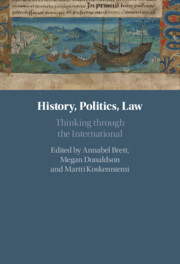Book contents
- History, Politics, Law
- History, Politics, Law
- Copyright page
- Contents
- Acknowledgments
- Notes on Contributors
- Introduction History, Politics, Law
- Part I Methods, Approaches and Encounters
- 1 Between History, Politics and Law
- 2 The Past according to International Law
- 3 The Context for Context: International Legal History in Struggle
- 4 After Method: International Law and the Problems of History
- Part II Thinking through the International
- Index
1 - Between History, Politics and Law
History of Political Thought and History of International Law
from Part I - Methods, Approaches and Encounters
Published online by Cambridge University Press: 28 September 2021
- History, Politics, Law
- History, Politics, Law
- Copyright page
- Contents
- Acknowledgments
- Notes on Contributors
- Introduction History, Politics, Law
- Part I Methods, Approaches and Encounters
- 1 Between History, Politics and Law
- 2 The Past according to International Law
- 3 The Context for Context: International Legal History in Struggle
- 4 After Method: International Law and the Problems of History
- Part II Thinking through the International
- Index
Summary
History of this, history of that: it’s easy to assume that ‘history’ is the same thing in each case, only with a different object. As every historian knows, however, that is not so. History is not a universal lens that can be trained indifferently on any random thing suspended in that turbid fluid called ‘the past’. Rather, there is a mutually constitutive relationship between the different kinds of things historians study and the different kinds of history they write. The framing tropes of political history differ from those of cultural history, for example, and spin their objects distinctively in each case. If historians take such different approaches, however, what makes them all historians nonetheless? Is there a point at which they are not, in fact, doing history at all, but something else – law, for instance? And what is at stake in asserting such a point? The premise of this volume is that this is a conversation worth having following the ‘international turn’ in history of political thought and the ‘historical turn’ in international law. This gives practitioners of both apparently the same objects – the works of Hugo Grotius, for example, or at least the particular work of his called, in English translation, The Law of War and Peace (or, The Rights of War and Peace – whose title is it anyway?). If history of political thought and history of international law are different kinds of history, however, they will spin these texts each in their own way, so that through the eyes of one they are works of political thought, through the eyes of the other works of law. But what is it for a work to be political thought rather than law?
- Type
- Chapter
- Information
- History, Politics, LawThinking through the International, pp. 19 - 48Publisher: Cambridge University PressPrint publication year: 2021
- 1
- Cited by



